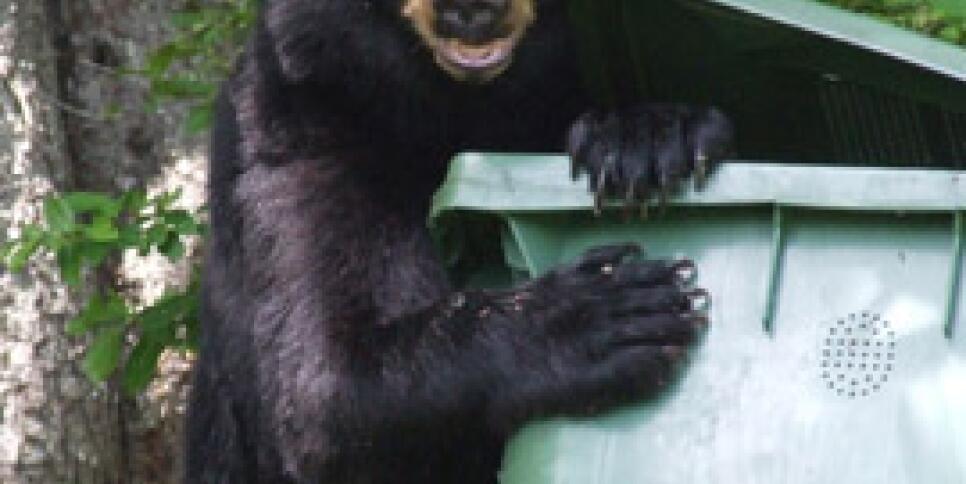
PICTOU – District 7 Coun. David Parker is cautioning Pictou County residents that black bears are here to stay and their interactions with the public will continue to increase.
“Bear numbers in Pictou County have quickly increased, likely caused by much less hunting pressure and they have now filled all available natural habitats. This will increase the conflicts with humans as they search for more food sources,” he said.
Coun. Parker, who has a B. Sc (Wildlife Biology) said precautions need to be taken because black bears will become aggressive if they feel threatened.
“Our black bears are not naturally aggressive toward humans. However, females with cubs are very protective. Their speed and power are much greater than ours and they must be respected.”
Information provided by the Nova Scotia Department of Lands and Forestry black bears are intelligent and naturally curious in their continuous search for food. If their curiosity is rewarded by finding food, they quickly learn to seek out similar situations, hoping to reap the same rewards even if it means becoming aggressive. They might continue to return to places where they have found food if the food supply lasts.
Further, a bear will return to these places’ weeks, months, or even in subsequent years, in hopes of again finding food at the same location.
It is the smallest member of the bear family in North America and only bear species in Nova Scotia.
-Adult males can weigh up to 440 pounds and adult females can weigh 264 pounds
- Black bears eat a variety of vegetable and animal matter, including roots, berries, nuts, grasses, insects, fish, small mammals, moose, deer calves and carrion.
- Studies have shown that bears can detect the smell of decaying vegetable matter and carrion up to 1.5 km (one mile) away.
Outside of the fall hunting and snaring seasons, bears can only be killed under the authority of a permit issued by the Department of Lands and Forestry. Normally, this permit is issued in problem situations after other preventative techniques have proven successful.
Preventative Actions:
The most effective way to prevent these situations is to remove (where possible) the attraction of food or to make it difficult to access. Once a bear has found a food source, it will likely return.
If possible, bear proof garbage cans should be made of metal. If cost is a factor, suitable containers can be made of lumber with a minimum dimension of 2”x6” and bolted together. Garbage bins should have a secure cover that cannot be easily opened by a bear.
Empty bins often and inspect them frequently for signs of damage or rot.
Keep bins away from forest cover that would allow bears to get at garbage undetected. Keep vegetation cleared a few meters around a garbage bin to reduce the chance of humans and bears meeting unexpectedly. Never leave garbage lying about your property, especially around houses and camps.
Do not intentionally feed food scraps to other wildlife such as deer, raccoons, squirrels, birds or chipmunks that might attract larger scavengers.
If you feed pets outdoors, make sure leftovers and spillage are removed from deck or yard after feeding time.
Avoid bird feeders in areas where bears are common. If you do use bird feeders, clean them regularly, keep seed dry to prevent spoilage and smell and do not allow spilled seed and husks to accumulate under feeders.
Green bins should be kept in shady by open areas, well away from adjacent forest cover. Meat, fish scraps and kitchen waste that are likely to develop a strong odor, should be frozen and put in the green bin on the morning of the pickup.
If you see a bear:
Stay at a distance and position yourself so that the bear is downwind from you. You may want to leave the area entirely.
Keep dogs under control when in bear habitat.
When in bear habitat make lots of noise. Some serious encounters between bears and humans occur because the bear was unaware of the approaching humans. Talk, sing, carry a portable radio, wear a small bell or rattle a pebble in a tin cup to warn a bear of your presence and give it an opportunity to leave the area.
A dog tied in the yard is a good early warning detection system. Bears are generally afraid of dogs and seldom hang around the vicinity of a barking dog, especially if they have not yet found food in the location.Never approach a bear or offer it food.
If you encounter a bear:
Stay calm, speak in a firm, authoritative voice while you back away. Do not look the bear directly in the eyes. Try to get upwind of the animal.
Move away slowly while facing the animal. Do not block any escape routes for the bear. Drop something – not food - to distract the bear as you move away.
Do not move loud noises, threatening gestures or sudden moves unless you are being attacked.
Never act physically aggressive towards a bear unless your life depends on it.
If a bear attacks you, fight back with everything you can and make a lot of noise. Use pepper spray if you have it with you. Don’t run.
In Other News
MOPC developing new policy for agricultural lands
Join the Conversation! The Municipality is developing a new land use policy for agricultural lands in MOPC in order to meet Provincial requirements.
Read More
Nominations open for Volunteer of the Year
April 19th to 25th is National Volunteer Week.
Read More
Applications open for Municipality of Pictou County Citizen Appointments 2026-2028
The Municipality of the County of Pictou currently has vacancies for the following volunteer positions:
Accessibility Advisory Committee (8 positions)
Two-Year Term, April 1, 2026 – March 31, 2028
The Accessibility Advisory Committee…
Read More
View all news
 Skip to Content
Skip to Content